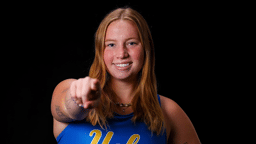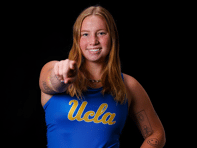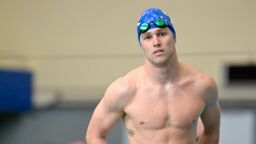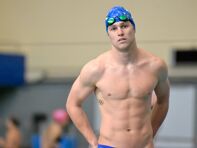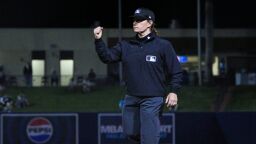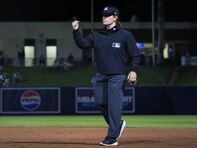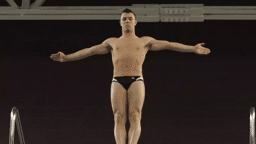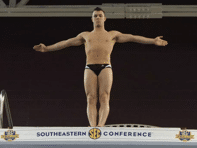Coming out seems like a distant concept for Scott Dyer.
It’s not because it feels so far into his future, but because it was so far in his past. The figure skater, who’s competed at a number of National Championships, came out to family and friends years ago.
Yet coming out he is, one last time, to the whole world in hopes of inspiring LGBT youth to be their true selves.
While he’s been down this road before, this one is still meaningful for Dyer. Totally out in his personal life, out to his competitors, out to his coaches and everyone else in his life in sunny Los Angeles, even covered in rainbow flags on social media, he understands why sharing his story of inclusion and acceptance, in the most public way possible, is important.
“We don’t want sports to separate us, we want them to be inclusive. That’s what sports are about. That’s what being an athlete is about.”
“It’s interesting to come back to this idea of being a gay man in the world of athletics and skating and recognizing I’ve been incredibly lucky and fortunate for the most part to live in a place where there’s acceptance,” he told Outsports.
Dyer knew at the age of 14 that he was different from the other boys at his private high school in Maryland. Being gay wasn’t a thing at the school amongst his classmates. It wasn’t discussed and no one was out. The only utterance of anything gay was from the few kids who would bully him for being a figure skater — a “gay” figure skater, they assumed correctly.
“The only time I heard ‘gay’ was in derogatory terms, to make fun of kids, to poke at them and make jokes. I definitely knew it wasn’t 100% accepted.”
While the figure skating brought out the bullies, it was also Dyer’s escape. At first that escape was a challenge. In elementary school he competed in his first event sanctioned by United States Figure Skating. He felt great about his performance, yet all he could muster in the scores of the judges was a last-place finish.
“I thought, I don’t want to get dead-last anymore, so I started training with different coaches and started skating every day.”
Despite a slow start to the sport, Dyer had by 2006 shown some real promise, finishing fourth in the novice category at Nationals that year. He even bested a current Olympian and friend at a competition in those early years.
“I competed against Adam Rippon in 2001 and I won. I tease him about the time I beat him when we were like 11 years old.”
Dyer would attend school in the morning, then at noon head to the ice rink for hours of training. It was a difficult regimen, but he came to embrace it.
Between his growing success, and the practice and competitions in the ice rinks, the sport became both his physical and mental escape from the school where he felt he was just a little bit different.
“I think being a figure skater helped that at the beginning,” he said. “Skating was an outlet, a way to get away from that private school environment I was in.”
Plus, he saw other gay men in his sport who seemed totally free on the ice. Some of them weren’t necessarily out to one another as teenagers, yet there was an understanding between many of them that they were a lot more alike than they would admit. Other skaters, a bit more mature in their 20s, were living their lives totally open in the skating world.
It was during his high school years that Johnny Weir was turning heads on the ice and making an unabashed name for himself. There are more openly gay current and former male athletes in figure skating than there are in any other professional or Olympic sport. While he didn’t begin coming out to people until he was 19, Dyer felt at home.
“I got the sense from them that there wasn’t anything ‘wrong’ with it.”

When Dyer did come out to his family and friends, both back home and at the Univ. of Southern California, the support he received washed away whatever nonsense he’d had to endure from his high school classmates.
“I came out when I was 19 to a very loving and supportive family,” he said. “I’ve been out to all of my friends at USC.
“To be able to talk about there being support and love in some places, maybe a kid in their teens or early 20s who doesn’t live in a big metropolitan city, or who doesn’t live in a family where they feel comfortable being themselves, maybe they will read this and have some hope.”
At the senior level, Dyer has finished in the top 15 at Nationals four times, with his best finish being 10th place in 2012. He said some “personal struggles” partially derailed his skating career from 2013 to 2015 before coming back strong two years ago.
“I competed against Adam Rippon in 2001 and I won. I tease him about the time I beat him when we were like 11 years old.”
Known for his spinning — some of the best in the country — and his artistry on the ice, he’s at a bit of a disadvantage in the current system that emphasizes big jumps. He says the current system is “less biased” than the one in place before the 2002 Winter Olympics scoring scandal, but for an athlete like himself who’s not a “natural jumper,” it’s hard to crack an Olympic team with the likes of huge jumpers like Nathan Chen.
This year Dyer finished 20th at Nationals, and he’s exploring what his future holds. He could continue to skate professionally, leave the sport entirely, or somewhere in between. Until then he’ll enjoy watching his friends and colleagues competing in the Winter Olympics, some of them continuing to show the world that gay men can be great athletes too.
“In sports we are equal regardless of sexual orientation and the color of our skin. I know Adam [Rippon] wants to be that role model for young gay men and women. And I think it’s great for the sport of figure skating to have things like these articles, and to have people like Adam and [pairs figure skater] Tim [LeDuc] and myself start talking about it. It should be something that is celebrated.
“We don’t want sports to separate us, we want them to be inclusive. That’s what sports are about. That’s what being an athlete is about.”
You can find Scott Dyer on Facebook. He is also on Instagram @scott_dyer_2014 and Twitter @ScottDyer26.







